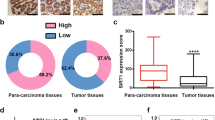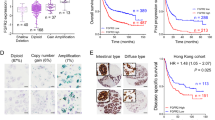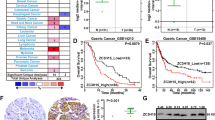Abstract
Although N-myc downstream regulated gene 2 (NDRG2) has been known to be a tumor suppressor gene, the function of this gene has not been elucidated. In the present study, we investigated the expression and function of NDRG2 in human gastric cancer. Among seven gastric cancer and two non-cancer cell lines, only two gastric cancer cell lines, SNU-16 and SNU-620, expressed NDRG2, which was detected in the cytoplasm. Interestingly, NDRG2 was highly expressed in normal gastric tissues, but gastric cancer patients were divided into NDRG2-positive and -negative groups. The survival rate of NDRG2-negative patients was lower than that of NDRG2-positive patients. We confirmed that the loss of NDRG2 expression was a significant and independent prognostic indicator in gastric carcinomas by multivariate analysis. To investigate the role of NDRG2 in gastric cancer cells, we generated a NDRG2-silenced gastric cancer cell line, which stably expresses NDRG2 siRNA. NDRG2-silenced SNU-620 cells exhibited slightly increased proliferation and cisplatin resistance. In addition, inhibition of NDRG2 decreased Fas expression and Fas-mediated cell death. Taken together, these data suggest that inactivation of NDRG2 may elicit resistance against anticancer drug and Fas-mediated cell death. Furthermore, case studies of gastric cancer patients indicate that NDRG2 expression may be involved in tumor progression and overall survival of the patients.
Similar content being viewed by others
Article PDF
Author information
Authors and Affiliations
Rights and permissions
This is an Open Access article distributed under the terms of the Creative Commons Attribution Non-Commercial License (http://creativecommons.org/licenses/by-nc/3.0/) which permits unrestricted non-commercial use, distribution, and reproduction in any medium, provided the original work is properly cited.
About this article
Cite this article
Choi, SC., Yoon, S., Park, Y. et al. Expression of NDRG2 is related to tumor progression and survival of gastric cancer patients through Fas-mediated cell death. Exp Mol Med 39, 705–714 (2007). https://doi.org/10.1038/emm.2007.77
Published:
Issue Date:
DOI: https://doi.org/10.1038/emm.2007.77
Keywords
This article is cited by
-
NDRG2 Promotes Lens Epithelial Cells Senescence via NLRP3/Caspase1-Mediated Pyroptosis
Applied Biochemistry and Biotechnology (2023)
-
NDRG2 gene expression pattern in ovarian cancer and its specific roles in inhibiting cancer cell proliferation and suppressing cancer cell apoptosis
Journal of Ovarian Research (2020)
-
N-myc downstream-regulated gene 2 promotes proliferation of HO-8910 ovarian cancer cells
Oncology and Translational Medicine (2018)
-
RETRACTED ARTICLE: Expression and prognostic value of the aldehyde dehydrogenase 1 (ALDH1) and N-myc downstream regulated gene 2 (NDRG2) as potential markers in human astrocytomas
Tumor Biology (2016)
-
Low expression of N-myc downstream-regulated gene 2 (NDRG2) correlates with poor prognosis in hepatoblastoma
Hepatology International (2016)



